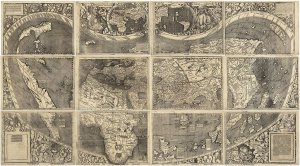Presented By: Eisenberg Institute for Historical Studies
EIHS Workshop: Contextualizing Columbus: Mobility, Place-Making, Periodization, and Islam

Islam played an important role as a catalyst for Columbus’ voyage across the Atlantic. The cosmopolitan Islamicate world that informed his journey united vast networks of far-flung trade routes with major urban centers. This panel will examine the important connecting threads of mobility, place-making, and periodization that inform analysis of his journey in three contexts. Travelling from premodern maritime trade routes to Mongol building projects, and utilizing Islamic endowment deeds and polemics against the Qur’an, this panel will explore the creative tensions of pre- and early modern place-making.
Presentations include:
The Ocean Blue: Spice Routes, Islam, and Globalization Before Columbus (Amanda Respess, Graduate Student, Anthropology and History, University of Michigan)
The event of Columbus’s voyage across the Atlantic represented a conjunction of short-term historical developments and long-term environmental and cultural patterns. This presentation will contextualize Columbus's attempt to reach the East by foregrounding the longue durée of premodern Indian Ocean maritime navigation, turning special attention to the role of Islam in early globalization in the eastern Indian Ocean and South China Sea.
Ghazaniyya: A City Built for a Sacred King (Golriz Farshi, Graduate Student, Near Eastern Studies, University of Michigan)
The conversion of the Ilkhanid Dynasty (1256-1353 C.E.) to Islam marked a transition in place-making practices and urban development by hitherto itinerant Mongols. The long-standing Islamicate tradition of mausoleum building supplanted the tradition of unmarked graves, and helped structure a new style of governance.This presentation will reconstruct the endowed model city of Ghazaniyya which centered on the mausoleum of the Ilkhan Ghazan Khan.
The Mobilization of Manuscripts and Papal Place-Making During the Transition from Medieval to Early Modern Europe (Kate Waggoner Karchner, Graduate Student, History, University of Michigan)
This presentation will broadly trace the transmission of a late thirteenth-century religious disputation of the Qur'an - Riccoldo da Montecroce's Against the Law of the Saracens - throughout early modern Europe, highlighting its link to moments of heightened awareness of the Ottoman Empire's threat to the traditional bounds of Christendom. The papacy used the polemic against an external threat as a tool to reassert its own position and reaffirm the need for traditional power dynamics in the face of challenges to its sovereignty.
Alan Mikhail (Professor, History, Yale University) will comment on the papers. Kathryn Babayan (Associate Professor; History, Near Eastern Studies, University of Michigan) will chair the panel.
Free and open to the public. Lunch provided.
This event is part of the Friday Series of the Eisenberg Institute for Historical Studies. It is made possible by a generous contribution from Kenneth and Frances Aftel Eisenberg.
Presentations include:
The Ocean Blue: Spice Routes, Islam, and Globalization Before Columbus (Amanda Respess, Graduate Student, Anthropology and History, University of Michigan)
The event of Columbus’s voyage across the Atlantic represented a conjunction of short-term historical developments and long-term environmental and cultural patterns. This presentation will contextualize Columbus's attempt to reach the East by foregrounding the longue durée of premodern Indian Ocean maritime navigation, turning special attention to the role of Islam in early globalization in the eastern Indian Ocean and South China Sea.
Ghazaniyya: A City Built for a Sacred King (Golriz Farshi, Graduate Student, Near Eastern Studies, University of Michigan)
The conversion of the Ilkhanid Dynasty (1256-1353 C.E.) to Islam marked a transition in place-making practices and urban development by hitherto itinerant Mongols. The long-standing Islamicate tradition of mausoleum building supplanted the tradition of unmarked graves, and helped structure a new style of governance.This presentation will reconstruct the endowed model city of Ghazaniyya which centered on the mausoleum of the Ilkhan Ghazan Khan.
The Mobilization of Manuscripts and Papal Place-Making During the Transition from Medieval to Early Modern Europe (Kate Waggoner Karchner, Graduate Student, History, University of Michigan)
This presentation will broadly trace the transmission of a late thirteenth-century religious disputation of the Qur'an - Riccoldo da Montecroce's Against the Law of the Saracens - throughout early modern Europe, highlighting its link to moments of heightened awareness of the Ottoman Empire's threat to the traditional bounds of Christendom. The papacy used the polemic against an external threat as a tool to reassert its own position and reaffirm the need for traditional power dynamics in the face of challenges to its sovereignty.
Alan Mikhail (Professor, History, Yale University) will comment on the papers. Kathryn Babayan (Associate Professor; History, Near Eastern Studies, University of Michigan) will chair the panel.
Free and open to the public. Lunch provided.
This event is part of the Friday Series of the Eisenberg Institute for Historical Studies. It is made possible by a generous contribution from Kenneth and Frances Aftel Eisenberg.